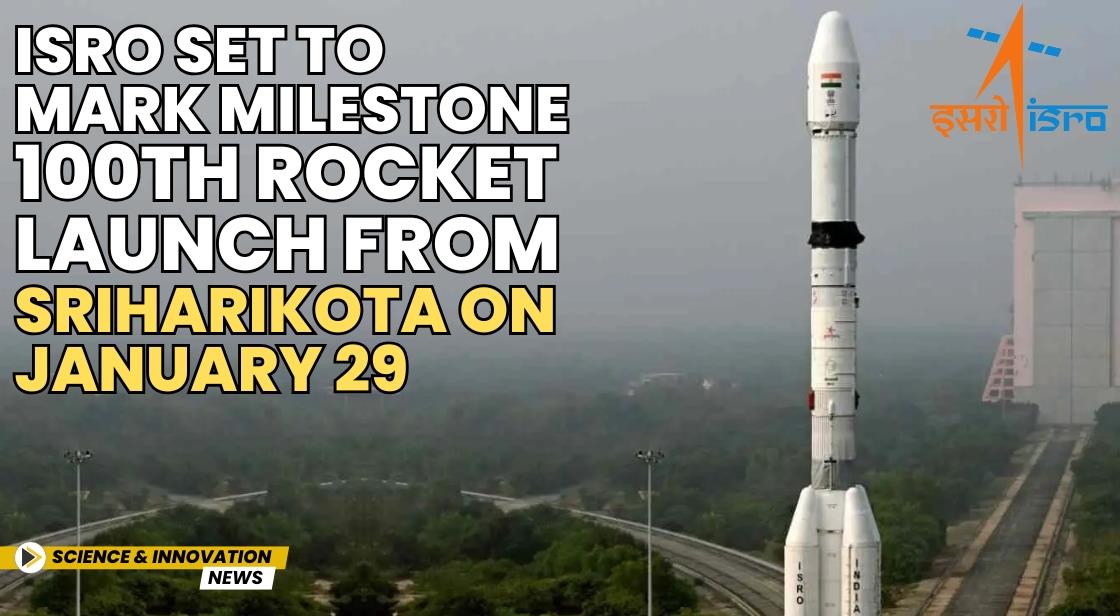ISRO Set to Mark Milestone 100th Rocket Launch from Sriharikota on January 29

News Synopsis
India’s space agency, the Indian Space Research Organisation (ISRO), is gearing up to achieve a significant milestone with the upcoming launch of the GSLV-F15 rocket. This mission will mark the 100th rocket launch from the Satish Dhawan Space Centre (SDSC) in Sriharikota, set to take place on January 29, 2025, at 06:23 hrs IST. ISRO announced the historic event on social media, marking the occasion with great enthusiasm.
The GSLV-F15 Mission and NVS-02 Satellite
The GSLV-F15 rocket, equipped with an indigenous cryogenic stage, will carry the NVS-02 satellite into Geosynchronous Transfer Orbit (GTO). This is a major achievement for ISRO, demonstrating its capability in space exploration and satellite launching. The NVS-02 satellite is part of India's second-generation navigation system, the Navigation with Indian Constellation (NavIC), which is designed to provide highly accurate Position, Velocity, and Timing (PVT) services.
A Journey Through ISRO's Space Launch Legacy
The first major rocket to lift off from Sriharikota was the Satellite Launch Vehicle (SLV) on August 10, 1979. Since then, ISRO has made remarkable progress in its space endeavors, and the upcoming GSLV-F15 mission marks a significant milestone as the 100th launch from this esteemed facility. Over nearly five decades, ISRO has achieved major successes in both satellite launches and the advancement of space technology.
GSLV-F15: A Key Mission for ISRO's Progress
The GSLV-F15 launch will be the 17th flight of the Geosynchronous Satellite Launch Vehicle (GSLV) rocket and the 11th mission featuring an indigenous cryogenic stage. These rockets have proven essential in ISRO’s journey to enhance its space exploration capabilities, and GSLV-F15 is no different. The mission's successful launch will further showcase the agency's progress in developing homegrown, high-performance space vehicles.
NavIC System: India’s Own Navigation System
The NVS-02 satellite is a crucial part of the NavIC system, India’s own regional satellite navigation system. It is designed to deliver accurate services across India and up to approximately 1500 km beyond the Indian border. NavIC’s services will be available in two types: Standard Positioning Service (SPS) and Restricted Service (RS), the latter offering even higher levels of accuracy for authorized users. With the inclusion of the NVS-02 satellite, the system will provide even more reliable, high-quality services.
Key Features of NVS-02 Satellite
The NVS-02 satellite is a second-generation satellite that comes with an array of new features to enhance its performance. One of the main upgrades is the satellite’s support for the L1 frequency band, which will significantly improve its reliability and expand its capabilities. The satellite will also have a lift-off mass of 2,250 kg, a power handling capacity of around 3 kW, and advanced navigation payloads in L1, L5, and S bands. Additionally, it will carry a ranging payload in the C-band. The NVS-02 satellite will be positioned at 111.75 degrees E, replacing the IRNSS-1E satellite.
The Impact of NavIC Services
NavIC will continue to play an integral role in offering reliable navigation services within India and its neighboring regions. The SPS feature provides position accuracy of better than 20 meters, while the timing accuracy is better than 40 nanoseconds within the service area. This system will significantly contribute to India’s self-reliance in space-based navigation, providing key services for multiple sectors, including transport, agriculture, and defense.
Conclusion: A Historic Moment for ISRO
The launch of the GSLV-F15 mission and the deployment of the NVS-02 satellite will not only mark a remarkable achievement in India’s space history but also enhance the nation’s capabilities in space-based navigation. As ISRO continues to expand its space program and technological advancements, the 100th launch from Sriharikota stands as a symbol of its achievements, positioning India as a leader in space exploration.
You May Like









